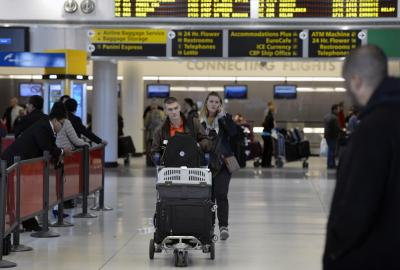Visa applicants from Malawi, Zambia to face up to 15,000 USD bonds to enter US
By IANS | Updated: August 6, 2025 06:59 IST2025-08-06T06:52:41+5:302025-08-06T06:59:48+5:30
Washington, Aug 6 US President Donald Trump's administration will first require visa applicants from Zambia and Malawi, two ...

Visa applicants from Malawi, Zambia to face up to 15,000 USD bonds to enter US
Washington, Aug 6 US President Donald Trump's administration will first require visa applicants from Zambia and Malawi, two African countries, to pay bonds of up to $15,000 for some tourist and business visas, the State Department said.
"Starting August 20, 2025, any citizen or national traveling on a passport issued by one of these countries who is found otherwise eligible for a B1/B2 visa must post a bond in amounts of 5,000, 10,000, or $15,000, determined at time of visa interview," the State Department said on Tuesday, in a notice on its website.
This requirement is part of a pilot program scheduled to begin August 20 and last until August 5, 2026. It will apply to nationals from certain foreign countries applying for B-1 or B-2 visas for business or tourist travel to the United States. These visas usually allow for a maximum stay of six months, though extensions are permitted in some cases, Xinhua news agency reported.
A State Department spokesperson on Monday said countries would be identified based on "high overstay rates, screening and vetting deficiencies, concerns regarding acquisition of citizenship by investment without a residency requirement, and foreign policy considerations."
The list of countries may be amended throughout the program, according to the notice.
"This requirement applies regardless of place of application," said the notice, adding that "a bond does not guarantee visa issuance, and if any individual pays fees without being directed to do so by a consular officer, that money will not be returned."
Disclaimer: This post has been auto-published from an agency feed without any modifications to the text and has not been reviewed by an editor
Open in app